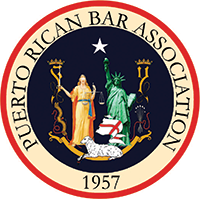
April 18, 2024
Attorney General Merrick Garland
U.S. Department of Justice
950 Pennsylvania Ave NW
Washington, DC 20530-0001
Dear Attorney, General Garland:
I write to you today as the President of the Puerto Rican Bar Association in New York (PRBA NY), an organization committed to fostering diversity, equity, and inclusion within the legal profession and advocating for the interests of our Latino community, and New York State as a whole.
We write to express our deep concern regarding the Justice Department’s continued reliance on the Insular Cases and the colonial framework these decisions established. The underlying logic of the territorial incorporation doctrine was based on the insidious belief that the people residing in the territories were racially and culturally inferior to Anglo-Saxon whites and therefore unfit for self-government.1 The racist logic of this doctrine is deeply inconsistent with our nation’s most basic constitutional and democratic principles, and as such, should be unequivocally rejected by the Justice Department.
In a recent legal brief, the Department revisited the Insular Cases, this time in the context of defending the constitutionality of PROMESA, which has been criticized for undermining the democratic governance of Puerto Rico. The Department acknowledged the problematic nature of the Insular Cases, stating that certain elements of these cases, particularly those invoking racist stereotypes, are “indefensible and repugnant.”2. However, it also noted that the current case did not serve as a platform to fully address the Insular Cases.
Such statements, while recognizing the insidious nature of these decisions, do not go far enough in denouncing the Insular Cases in their entirety. The Department should go further, much as it did in 2011 when it condemned the Supreme Court’s infamous decision in Korematsu v. United States.3 As Justice Sotomayor recently declared, the Insular Cases are “premised on beliefs both odious and wrong,” with Justice Gorsuch agreeing that “[t]hey deserve no place in our law.”4 The Justice Department should follow the lead of Justices Sotomayor and Gorsuch and expressly reject the Insular Cases and the racist logic of the territorial incorporation doctrine.
The arbitrary and unequal treatment of residents in U.S. territories is not just a relic of the past – it is an ongoing legacy that continues to affect the people of Puerto Rico today through many federal policies and programs. This disparity is evident in programs like Supplemental Security Income (SSI), whereby recipients residing in the states and the District of Columbia are entitled to an average monthly benefit of $574. In contrast, alternative benefits available to those in Puerto Rico average a mere $82 a month. This substantial gap highlights the inequality and underscores the urgent need to improve the quality of life for 3.2 million American citizens residing in Puerto Rico.
President Biden has addressed continued discrimination against Americans in U.S. territories, declaring that “there can be no second-class citizens in the United States of America” and that they should have “the opportunity to determine their own political future.”5 But the nearly 4 million residents of Puerto Rico and other U.S. territories will continue to be denied democracy so long as the Insular Cases define their relationship with the United States. The Justice Department has the opportunity to redress this historic error by unequivocally rejecting the discriminatory and racist doctrine of territorial incorporation established by the Insular Cases.
Thank you for your attention to this matter. Should you need further information, please do not hesitate to contact me.
Respectfully,
Jason Canales, Esq.
67th President of the
Puerto Rican Bar Association
Cc:
Tom Perez, Director for the White House Office of Intergovernmental Affairs
Elizabeth Prelogar, Solicitor General of the United States
Benjamin C. Mizer, Acting Associate Attorney General
Kristen Clarke, Assistant Attorney General for Civil Rights
1. See Downes v. Bidwell, 182 U.S. 244 (1901); De Lima v. Bidwell, 182 U.S. 1, *219 (1901).
2. Memorandum of Law of the United States in Support of the Constitutionality of PROMESA at 16, In Re Fin. Oversight & Mgmt. Bd. For P.R., Case No. 17 BK 4780-LTS (Bankr. D. PR Mar. 13, 2024) (emphasis added).
3. Statement by the U.S. Dep’t of Justice, Office of the Solicitor General, Confession of Error: The Solicitor General’s Mistakes During the Japanese-American Internment Cases (May 20, 2011).
4. United States v. Vaello Madero, 142 S. Ct. 1539, 1560 n.4 (Sotomayor, J., dissenting); id. at 1552, 1557 (Gosuch, J. concurring).
5. Statement by the Executive Office of the President, Office of Management and Budget, on H.R. 8393, the Puerto Rico Status Act (Dec. 15, 2022).
